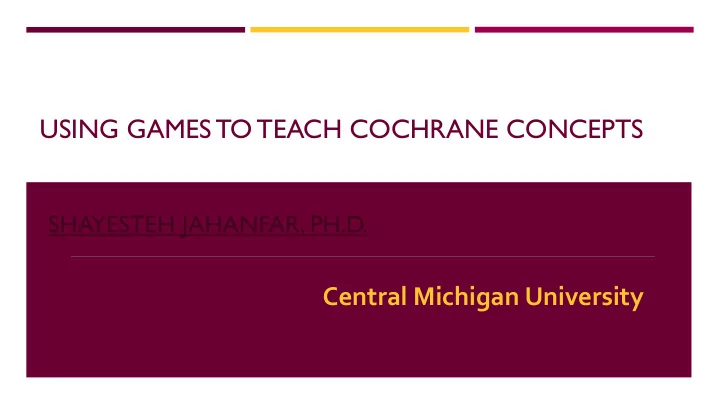

USING GAMES TO TEACH COCHRANE CONCEPTS SHAYESTEH JAHANFAR, PH.D. Central Michigan University
DISCLOSURE I have no funding resources or conflicts of interest
BACKGROUND Gamification and game-based learning are not new concepts but it is important to implement them in Cochrane training The core concept behind game-based learning is teaching through repetition, failure and the accomplishment of goals. Game-based learning takes this same concept and applies it to teaching a curriculum. Boeker M. 2013: Game-Based E-Learning Is More Effective than a Conventional Instructional Method: A Randomized Controlled Trial with Third-Year Medical Students; Result: Game-based e-learning is more effective than a script-based approach for the training of urinalysis in regard to cognitive learning outcome and has a high positive motivational impact on learning Gorbanov L, 2018:A systematic review of serious games in medical education: quality of evidence and pedagogical strategy
OBJECTIVES To explain how the use of game-based learning can be considered a golden opportunity to help adult learners develop skills they would not normally gain in a lecture-based classroom.
DESCRIPTION Cochrane standard author training includes a compact, three days of heavy training that may be hard to digest for adult learners. It is crucial to ensure a successful integration of games into the classroom by soliciting feedback from the audience to help fine tune the curriculum or the teaching process. Games can introduce goals, interaction, feedback, problem solving, competition, narrative, and fun learning environments, elements that can increase learner engagement and sustain enthusiasm.
HOW DID WE DO IT? Four interactive exercises will be presented including use of Parachute, Strong exercise, Dart game, and Circle of Cochrane. The presenter will practice these games with the attendees. This workshop will be a fun and engaging workshop. A discussion will be held at the end to identify new ideas to present the most difficult concepts during the training workshops.
WHY Informal assessment Drilling concepts Reviewing concepts Create a competitive learning environment Bring joy in to learning process Shifting from didactic to interactive learning Move to get energized
PARACHUTE The objective was to identify elements of collaboration, team work and care
PARACHUTE
TUG OF WAR, ONLY A STRONG TEAM WITH ALL THE EXPERTISE WILL GET TO SUCCESSFUL PUBLISH A REVIEW One side is the author group, the other side is the CRG exchanging the review edits, reviewers’ comments, etc. Who will win? Strong team work, have a mentor, methodologist, statistician, clinician, librarian on the team are elements of success
DART: THIS EXERCISE IS USED ON THE SECOND OR THIRD DAY OF WORKSHOP Competition: This technique is used to imprint concepts that are discussed each day of the workshop
NETWORK: HOW IS A REVIEW SHAPED? The facilitator discusses various steps of a systematic review by throwing a ball of string to a participant and expects participants to answer questions
THREE CIRCLES: AUTHORS, CRG, REVIEWR What is the responsibility of each sector? Write on colored papers and stick them in the right circle.
ANSWER WHEN YOU CATCH
I CATCH YOU IF YOU FALL: EXERCISE ON IMPORTANCE OF TEAM WORK
WE USE VARIETY OF SPEAKERS, GIVE GIFTS AND PRICES The workshop is supported by facilitators who support the group activities
FISH BOWL Write down one question concerning the gaming techniques when teaching Cochrane standard author training workshop
QUESTION TIME What other games can you think of?
SMALL GROUP ACTIVITY Instructions: Let’s do the 1. I catch you if you fall 2. String activity
EVALUATION https://www.surveymonkey.co.uk/r/HHX937J
Recommend
More recommend